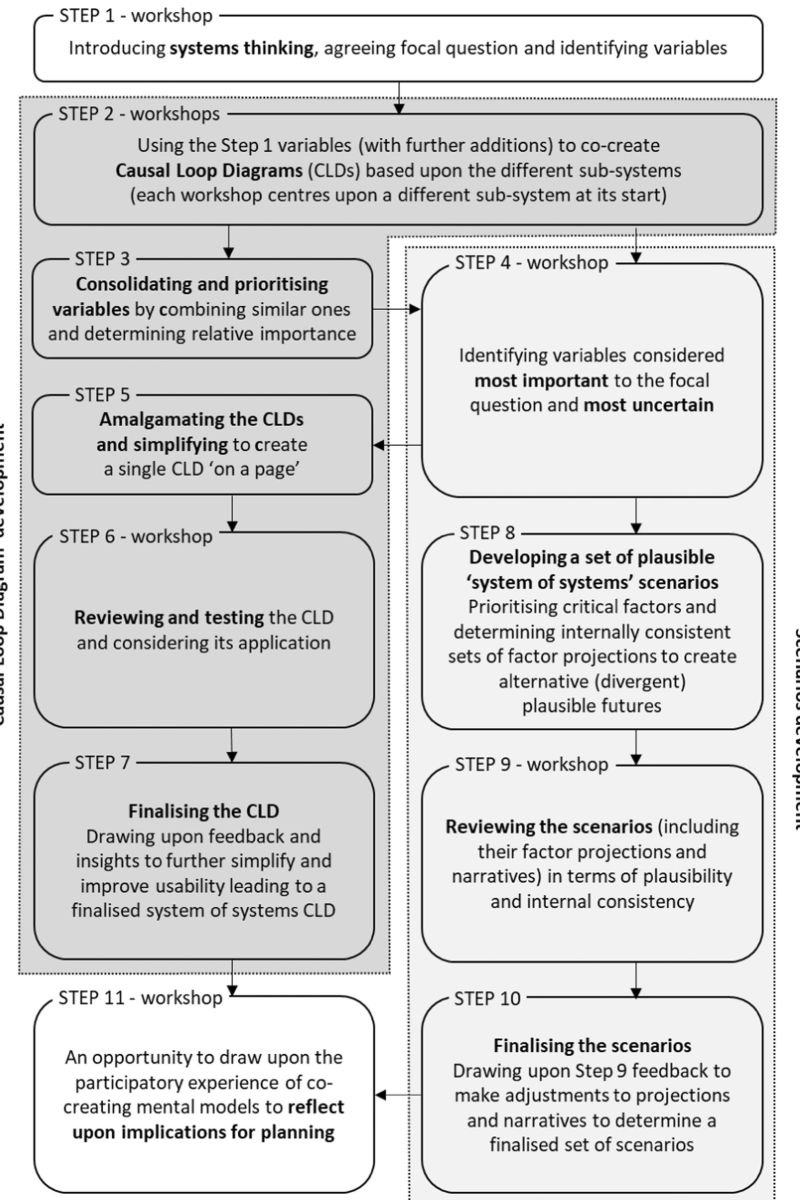20250914
“Planning for the future involves making sense of the present and examining possible changes in key factors that can influence the future. Actors rely upon mental models of the system that planning addresses: their simplified interpretations of the makeup of system elements and element interactions that together determine how the system works. It follows that a helpful foundation for strong planning is to develop a shared mental model among actors of the system of interest in the present and use this in turn to create mental models of possible futures for the system (scenarios). This paper presents a methodology for doing this that incorporates co-creation of causal loop diagrams that in turn inform development of scenarios.”
AI: The Gulf bet. Fighting AI sleeper agents. Unmasking ICE officers. Glitches at TacoBell.
Security: North Korea workers in the US. Private intelligence in the UK. US warships and Venezuela.
People: MIT class for making anything. Gift of consciousness. Lewis and Clark laxatives.
Tech: Pig lung transplant. 1980’s computer magazines. Hirudotherapy. Seeing infrared. Wifi measures heartbeat. Playing snake with water.
Foresight: shared mental models.
Business: CZ bans communist propaganda. Rowing across the Pacific.

Cosmic Whispers in Oak Grove
In a nondescript American suburb, homeowners were engaging in an unholy truce with a looming cosmic specter. It started with an email inviting them to partake in "Invisibility Assurance," a service pitched under the headline: “Want To Keep Your Secrets Safe? We Turn Your House Into A Black Hole!” It promised the dual benefits of home security and an innovative new lifestyle. The company, unironically named Unseen Tech, exploited fear—fear of nosy neighbors, invasive AI, and North Korean IT schemes that, frankly, made even the most recent Taco Bell order-gone-wrong seem charmingly mundane. In the end, the good folks of Oak Grove signed their lives away, enticed by promises of anonymity (and alluring tacit agreements they never actually read).
Meanwhile, Derek, the local history buff, submerged himself in nostalgia, thumbing through yellowed technology magazines from the 90s. Finding a snippet about an early AI poet, he experienced an epiphany: "What if I could have a conversation with it?" After a mild existential crisis involving a leech therapy pamphlet he found humorously wedged between pages, he realized he’d discovered the modern-day equivalent of an oracle hidden in every postman’s delivery. “I'm basically a techno-sybil,” he declared—another bizarre reputation the neighborhood could gloat over.
As Derek’s musings grew more ambitious, his brother Matt took on a different obsession: Pulse-Fi, a WiFi-based heart-rate monitoring tool. Stubbornly clinging to his flip phone, he argued passionately that wearable tech was just a ploy by the ‘well-connected’ elite to keep tabs on the rest of us. “Imagine the vital signs of every jelly-sandwich-eating citizen tracked by the government!” he ranted during Friday board game nights, while Derek quietly entertained thoughts about connecting the pulse tracking to AI poetry. Surely, an AI that measured heartbeats could lead to poetic masterpieces!
And so their lives stringed together like HDMI cables, weaving through discussions of the new “Military Impulse AI” that was allegedly being fed data by clandestinely implemented systems, echoing eerie government operations about drug trafficking figures—and who could forget the state-of-the-art AI being rolled out in Gulf States, harkening back to the pearls of wisdom delivered through timeworn technology magazines? Derek could practically hear the laments of long-lost geniuses whispering “not yet, we aren’t ready” from archival pages.
In the midst of it all, an unassuming person named Chet began to notice that his culinary education had turned into a surreal art of making talk of leeches a hot topic at dinner parties, miraculously managing to get dates despite slightly odd conversational detours. “They can help!” he beamed at fellow dinner guests, recounting stories of Napoleon as a leech aficionado, tinged with the philosophical overtones of Mr. Markowitz’s “survivor’s euphoria,” which he stumbled upon during a documentary binge. And suddenly, dinner was not just dinner—it became a symposium on the power of survival, the mysteries of technology, and the steep hill trod by humans longing for the extraordinary (and occasionally failing to place their Taco Bell orders correctly).
Yet it was the leaked government documents regarding “sleeper AI agents” that drew everyone into a collective frenzy, heated discussions at the local coffee shop revealing attempts to understand the implications of such AI agents while simultaneously questioning whether they were being monitored by said agents. The parched old coffee cups of conspiracy theories found a new refill, utterly unhinged but overwhelmingly fascinating.
As the sun steadily set over Oak Grove, illuminating the lives being tangled up in motivations, fears, and the intoxicating allure of the unknown, one thing became resolutely clear: The future might just be a mad, holographic song played through a kitchen Wi-Fi router—not at all unlike that old AI poet. And somehow, that made the past and present blur together in a perfect cocktail of absurdity and intrigue.
Thus, the neighbors of Oak Grove reveled in a reality that was both decidedly average yet profoundly intricate—a world straddling the line between the whimsical and the ominous, trying desperately to understand the strings that bind connection, isolation, and discovery in this brave new age.

